 Update: See note [1] on where candobetter.net's values differ from those apparent on Party for Freedom site. John Ajaka, the NSW Minister for Multiculturalism's indignation at Nick Folkes's (Party for Freedom)[1] protests against foreign property ownership in Australia would ring truer if Ajaka distanced multiculturalism from the billion dollar property development growth lobby that has captured the multicultural tag. See Background on the Australian Multicultural Foundation. Instead he sounds like a hypocrite attacking an Australian who tries to stand up to this Goliath.[2] Unfortunately multiculturalism has become code for mass migration and a political shield for a powerful global network of engineers, banks and financiers, property developers, government departments and academic propagandists, represented by numerous peak bodies of which the Property Council of Australia is probably foremost. The Fairfax and Murdoch Press are members of this growth lobby with strong vested interests in their own huge property dot coms, realestate.com.au and domain.com.au. The major political parties are similarly invested, with the Labor Party's stake best known, but it is no Robinson Crusoe.
Update: See note [1] on where candobetter.net's values differ from those apparent on Party for Freedom site. John Ajaka, the NSW Minister for Multiculturalism's indignation at Nick Folkes's (Party for Freedom)[1] protests against foreign property ownership in Australia would ring truer if Ajaka distanced multiculturalism from the billion dollar property development growth lobby that has captured the multicultural tag. See Background on the Australian Multicultural Foundation. Instead he sounds like a hypocrite attacking an Australian who tries to stand up to this Goliath.[2] Unfortunately multiculturalism has become code for mass migration and a political shield for a powerful global network of engineers, banks and financiers, property developers, government departments and academic propagandists, represented by numerous peak bodies of which the Property Council of Australia is probably foremost. The Fairfax and Murdoch Press are members of this growth lobby with strong vested interests in their own huge property dot coms, realestate.com.au and domain.com.au. The major political parties are similarly invested, with the Labor Party's stake best known, but it is no Robinson Crusoe.
 The multicultural cloak has been given unmerited authority and power by vested interest and protection from political figures. Nick Folkes is a working man attempting to lead protests against mass dispossession of Australian citizens by virtually unregulated foreign property buyers who are outbidding Australians and contributing to an overpriced Australian housing market.
The multicultural cloak has been given unmerited authority and power by vested interest and protection from political figures. Nick Folkes is a working man attempting to lead protests against mass dispossession of Australian citizens by virtually unregulated foreign property buyers who are outbidding Australians and contributing to an overpriced Australian housing market.
The multiculturalist Goliath is well-organised to maintain and increase focused financial benefits from high immigration, but the Australian public, which wears the cost of mass immigration and land-speculation, has great difficulty organising to combat it.
This disorganisation of the masses is largely due to the way the Fairfax, Murdoch and ABC media manage 'public' debate to reflect the opinions of the big end of town whilst pretending to reflect those of the majority. Although population growth is a constant topic in the mass media, the media usually only publishes criticism of the growth lobby if they can pretend such criticism is laced with innuendos of racism, NIMBYism or can be stigmatised as 'ignorant'. Whilst Tony Abbott is cocooned by his party and the mainstream media against public criticism for wearing his foot in his mouth, we can expect that Nick Folkes will be afforded no such protection for speaking plainly against narrow financial interests that cost most Australians.
There are huge sums of money involved in the population growth and foreign investment that uses multiculturalism to censor criticism of its projects and muzzle those it disadvantages. According to the Foreign Investment Review Board, China overtook the United States as the biggest source of proposed foreign investment in Australia in 2013-14 and may soon 'pump $60 billion into housing' here. The ABC reports that Knight Frank property developers and realtors 'showed Chinese investment in the Sydney and Melbourne property markets doubled last year and that Chinese investors spent more on Australian real estate than on properties in London and New York for the first time'. http://www.abc.net.au/news/2015-05-29/chinese-invasion-leaflet-campaign-slammed-as-idiotic/6506412
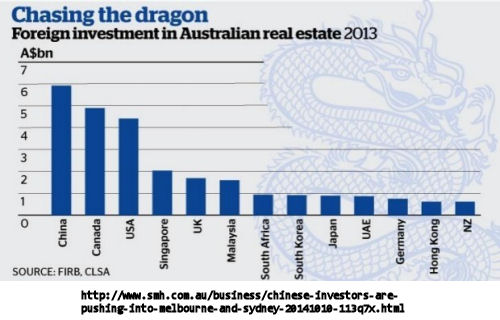
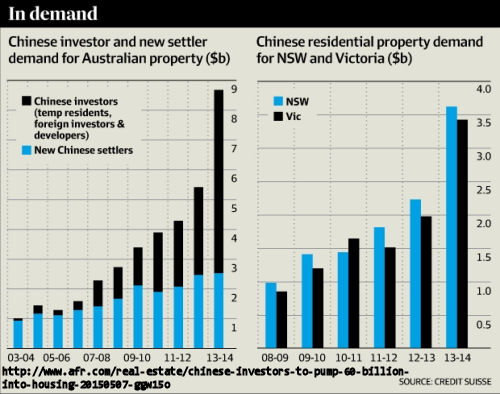
Numbers and wedge politics
It makes you think that Pauline Hanson's speech writer was on to something when he had her say in 1996 that Australia was in danger of being 'swamped' by Asians. Americans and Canadians are still not far behind though in driving up housing prices, resource demand and development expansion over Australia's fast diminishing green spaces.
In 1996 Australia's population was 18,300,100. At 31 May 2015 it had grown by 5,306,010, that is, by more than a quarter, and was 23,838,210 (Source). From 2009 planned invited economic mass immigration of between 250,000 and 300,000 per annum far outweighed Australia's natural increase (births minus deaths) of 150,000 per annum.
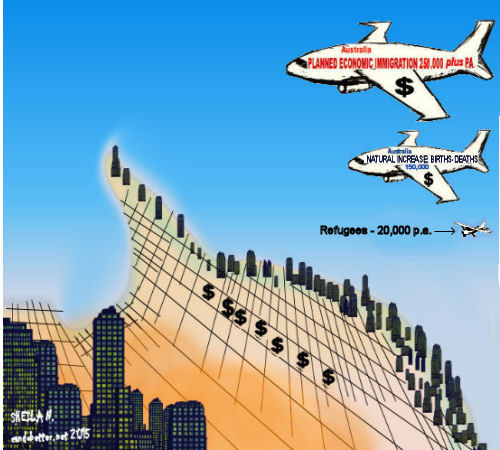
Every effort has been made by the authorities to confuse the public about the numbers. In 2006 immigration statistics became uncomparable with those before 2009 after the statistical method was changed.[3] There have been concerted mediatised wedge politics to
(a) confuse planned invited economic immigration and paying foreign students with refugees and asylum seekers, and
(b) stigmatise asylum seekers and refugees as overwhelmingly freeloaders and criminals
This confusion has divided the community, journalists and political party members.
A better informed public could unite against overpopulation that is inflating the cost of living and housing here and the illegal wars that are creating huge numbers of refugees and economic immigrants as economies and nations are destroyed by global investment in war and 'development'. Instead the wider community has been relegated to a passive and worried audience as mass media anointed 'community leaders' pontificate on the imminence of terrorism and the need to retreat into a police state or engage indefinitely overseas in wars against terrorism. (See, for example, David Kilcullen, "Blood Year,"Quarterly Essay, No.58, May 2015).
Leaflets distributed by Nick Folkes say, "Aussie battlers are being pushed to the fringes of our cities while foreign intruders are reaping the benefits of our hard-working previous generations." "The new dispossessed or forgotten people will one day be remembered as the 'stolen generation' priced out of their market by invading Chinese foreigners." He might have rephrased his proposition more 'correctly' as a complaint that organised mass migration was inflating the property market, without pointing at particular national or ethnic beneficiaries, but he wouldn't have received mass media coverage then by taking advantage of the mass media headlines which said exactly the same thing:
"Cashed-up Chinese are pricing the young out of the property market".
"Sydney house prices driven by Chinese 'bolthole' buyers".
"Chinese investors are pushing into Melbourne and Sydney."
Although some put it in triumphant economic terms:
"Real Estate: Vendors delighted as Chinese buyers flock to Glen Waverley and Mt Waverley."
"Chinese property investment through the roof: What it really means."
"China's $60 billion Australian property splurge"
It didn't matter whether the media put its articles about Chinese investment in positive or negative terms, property agents still advertised close to these stories. The developers and investors, including the newspaper property dot coms cannot lose in this globalised market as long as there is population growth.
Politics and power
Ecological groups have for years earnestly and soberly criticised trends to overpopulate Australia by citing immigration statistics and the impact of overdevelopment on Australia's environment and ecology, hardly making a ripple in the mainstream media or the awareness of the general public, despite the fact that population growth is the number one topic in the mass media. The fact is that the Australian public have been sensitised by commercial and public mass media to multiculturalism and economic terms and desensitised to ecological and scientific terms. A political movement that succeeds in mobilising Australians against population growth is likely to use the terms the public are most familiar with and those are the ones that the mass media consistently use. This is the case with Nick Folkes's Party for Freedom.
Nick Folkes is trying to register his Party for Freedom as a political party. Success could be dangerous. Tony Abbott, then parliamentary secretary to the Minister for Employment, Education, Training and Youth Affairs , organised the Australians for Honest Politics Trust in 1996, which financed litigious activity culminating in the jailing of Australian politician Pauline Hanson in 2003 on the grounds that her party was improperly constituted. See https://newmatilda.com/2012/12/11/how-abbott-funded-fight-against-one-nation. Although sentenced to prison for three years, Hanson was freed on an appeal which found that her party was in fact legally constituted. But the message had been delivered to Australian citizens and residents that if they criticise mass immigration and the industries that cultivate it, punishment will come from the top. John Howard, the Prime Minister in 2003 explained to Lateline, "It's the job of the Liberal Party to politically attack other parties," but actually, it looks as if the top job is to protect the growth lobby. Tony Abbott is now Australia’s Prime Minister.
NOTES
[1] The title of this article was originally, "Nick Folkes a David standing up to a Multicultural Goliath," but we have changed it, regretfully. Even though Mr Folkes shows some courage in standing up to power, in the form of the multicultural property development lobby, his website features articles and comments of which we don't want to appear to approve. These comments and articles use 'scientific' theory against specific groups of peoples. For instance, one article discusses a high rate of cousin marriage in a particular people as if it were unusual or hazardous incest. That is a popular view that does not take into account the widespread role of endogamy in preserving land within a people, and other factors that need to be taken into account when assessing cousin marriage. In fact, a high rate of endogamy need not be genetically damaging; it can be beneficial, both in terms of preserving control over territory and in strengthening positive traits. Depending on the public relations, where one highly endogamous group can be stigmatised for 'inbreeding stupidity' another may be famous for 'inbreeding genius'. When assessing the impact of marriage and land-tenure traditions on genetic inheritance, environment and changes to economy, diet, and social organisation also need to be taken into account. See http://candobetter.net/node/3197 about the importance of dynasties in modern power. There is also a comment on the Party for Freedom site suggesting that a particular group of people have lower average I.Q.s that other people. IQ tests are not reliable when dealing with culture and language differences and this theory also does not take into account mass dispossession and changes to economy, diet and social organisation - and the impact of drugs and alcohol. It's a pity that the Party for Freedom does not seem to be able to see how fighting between groups weakens the ability of Australians to stand up to the powers that have overtaken national control of land, housing and economic benefits.
[2] "The man behind a letterbox campaign warning Sydney's housing market is under threat from 'Chinese invasion' is an idiot, New South Wales' Multiculturalism Minister says."
[3] ↑ "Technical note: '12/16 month rule' methodology for calculating net overseas migration from September Quarter 2006 onwards." In itself this was a tragedy because Australia shared with France the distinction of havg the longest set of comparable demographic statistics in the world.
 Super Members Council warns that allowing first homeowners to withdraw their super for a house deposit could see property prices rise by nearly $75,000 across Australia’s five largest capital cities, new modelling from the Super Members Council shows. Pouring retirement savings into housing would inflame an already-inflated property market – pushing up the major capital city median price by an estimated 9%.
Super Members Council warns that allowing first homeowners to withdraw their super for a house deposit could see property prices rise by nearly $75,000 across Australia’s five largest capital cities, new modelling from the Super Members Council shows. Pouring retirement savings into housing would inflame an already-inflated property market – pushing up the major capital city median price by an estimated 9%.
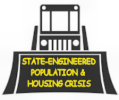 Dr Dorina Pojani is Associate in urban planning at the University of Queensland, Australia, with a degree in Urban Planning from Albania.
Dr Dorina Pojani is Associate in urban planning at the University of Queensland, Australia, with a degree in Urban Planning from Albania. Recent analysis
Recent analysis 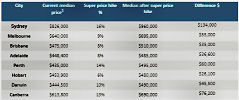 A fundamentally flawed proposal to bust open super for first home buyers housing deposits could hike the nation’s five major capital city median property prices by between 8-16%, preliminary analysis from Industry Super Australia shows.
A fundamentally flawed proposal to bust open super for first home buyers housing deposits could hike the nation’s five major capital city median property prices by between 8-16%, preliminary analysis from Industry Super Australia shows.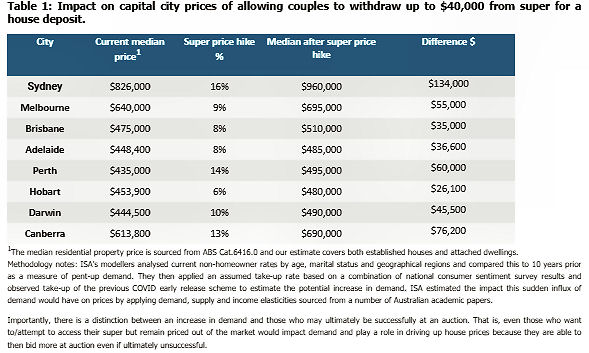
 Previous research has shown a wide split between elite and non-elite opinion on topics such as cultural diversity, globalisation and immigration. Media professionals and most politicians share these elite views, but large swathes of the electorate do not. The current findings of the survey conducted late in 2018 by The Australian Population Research Institute (TAPRI) on attitudes to immigration and population growth confirm this. They show that the split between elite and non-elite opinion is mirrored in the divisions between voters who are university graduates and voters who are not. This is logical as most elites are now recruited from the graduate class. The gap is wide. Overall 50% of voters want a reduction in immigration. But this proportion rises to 60% of non-graduates while only 33% of graduates agree. (The October/November 2018 TAPRI survey Katharine Betts and Bob Birrell.)
Previous research has shown a wide split between elite and non-elite opinion on topics such as cultural diversity, globalisation and immigration. Media professionals and most politicians share these elite views, but large swathes of the electorate do not. The current findings of the survey conducted late in 2018 by The Australian Population Research Institute (TAPRI) on attitudes to immigration and population growth confirm this. They show that the split between elite and non-elite opinion is mirrored in the divisions between voters who are university graduates and voters who are not. This is logical as most elites are now recruited from the graduate class. The gap is wide. Overall 50% of voters want a reduction in immigration. But this proportion rises to 60% of non-graduates while only 33% of graduates agree. (The October/November 2018 TAPRI survey Katharine Betts and Bob Birrell.) We encourage you to join us in a campaign which, if supported by you, has the potential to force the state government to abandon its plans to privatise the public housing sector. This campaign is being co-ordinated by Public Interests Before Corporate Interests (PIBCI www.pibci.net) and is endorsed by PIBCI, Friends of Public Housing – Victoria and the Wednesday Action Group. We expect many more organisations to endorse this campaign over the coming weeks. Let us know if you wish to endorse the Defend and Extend Public Housing campaign:
We encourage you to join us in a campaign which, if supported by you, has the potential to force the state government to abandon its plans to privatise the public housing sector. This campaign is being co-ordinated by Public Interests Before Corporate Interests (PIBCI www.pibci.net) and is endorsed by PIBCI, Friends of Public Housing – Victoria and the Wednesday Action Group. We expect many more organisations to endorse this campaign over the coming weeks. Let us know if you wish to endorse the Defend and Extend Public Housing campaign: 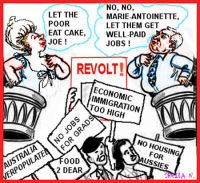 Some recent comments reproduced here. Please contribute more. Joe Hockey seems like a nice guy, an intelligent guy, but he's just too rich to be really useful to anyone who isn't. He reminds me of Marie-Antoinette, a foreign princess who didn't want to try to understand the problems of the people and her husband. People look back and say, "How could she be so silly? Couldn't she see that the people were angry and desperate?" But, you know, she had other priorities.
Some recent comments reproduced here. Please contribute more. Joe Hockey seems like a nice guy, an intelligent guy, but he's just too rich to be really useful to anyone who isn't. He reminds me of Marie-Antoinette, a foreign princess who didn't want to try to understand the problems of the people and her husband. People look back and say, "How could she be so silly? Couldn't she see that the people were angry and desperate?" But, you know, she had other priorities.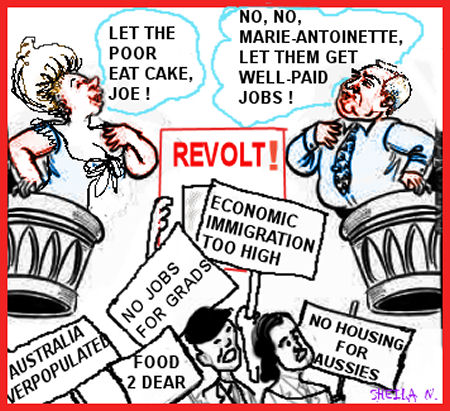
 Update: See note [1] on where candobetter.net's values differ from those apparent on Party for Freedom site. John Ajaka, the NSW Minister for Multiculturalism's
Update: See note [1] on where candobetter.net's values differ from those apparent on Party for Freedom site. John Ajaka, the NSW Minister for Multiculturalism's  The multicultural cloak has been given unmerited authority and power by vested interest and protection from political figures. Nick Folkes is a working man attempting to lead protests against mass dispossession of Australian citizens by virtually unregulated foreign property buyers who are outbidding Australians and contributing to an overpriced Australian housing market.
The multicultural cloak has been given unmerited authority and power by vested interest and protection from political figures. Nick Folkes is a working man attempting to lead protests against mass dispossession of Australian citizens by virtually unregulated foreign property buyers who are outbidding Australians and contributing to an overpriced Australian housing market. 


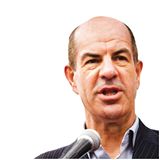

Recent comments